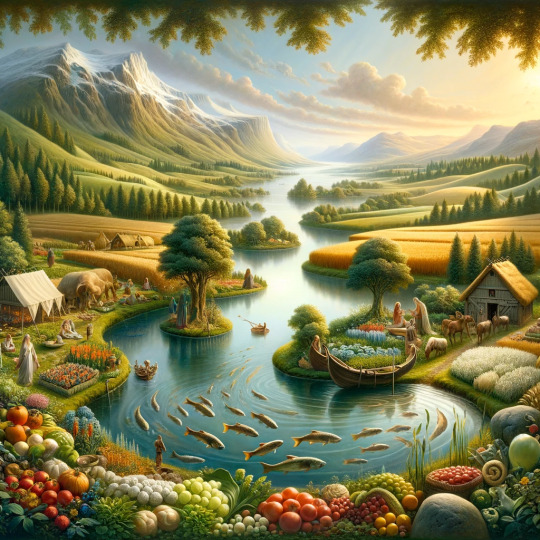#friðr
Explore tagged Tumblr posts
Text
Jera
I am seasons I am harvest I am preparation I am the Turning of the Wheel I am the gathering of the crops I am the slaughter of the animals I am the given gifts of the ground I am the taken gifts of the animal I am the dropped gifts of the trees I am the reckoning of time I am the movement of stars I am the sky-keeper I am the welcome Spring I am the good Summer I am the bountiful…
#animism#animist#ars#Aun#change#frið#friðr#frida#harvest#Jera#movement#Mundilfari#poem#polytheism#polytheist#prayer#rune#Runes#Runevaettir#Runevættr#season#seasons#song#time#vaettir#vaettr#year
17 notes
·
View notes
Text
so we already know i’m a huge minecraft diaries fan and i want to take some insoiration from it for my book.
in my book, there are 5 immortals known as the friðr (the old norse word for peace). they are known to me as the original friðr since there is a new generation
one and like three fourths of the immortals are villains (as in one is a fully fledged villain, one is a follower, and another is misguided). two are heroes. they gained immortality when shay (the fully fledged villain) killed one of the elder gods. this is when a civil war broke out between the 5. they separated and nearly destroyed each other, but somehow survived (i don’t know how just yet), but that’s not important. what’s important is the gods are furious at shay and really all 5 of them for stealing immortality, which they see as something that was not theirs to take.
i need a way for the 5 of them to stay alive and not be targeted by the gods and i’m not sure what to do. what do they do to escape the gods’ wrath/immortality if they didn’t want it?
shay runs an assassin academy for specialized fighters to protect himself from the gods’ wrath and any mortals they use to get the job done.
rhosyn, the follower, stays with shay and is protected by the assassins.
zyan, the misguided villain, i think reinvents identities every 70 ish years.
mara and anneth, the two heroes who never wanted immortality, also reinvent themselves, but they’ve found a way to come as close to dying as they physically can. what i’m thinking they do is, they invented a way to deage themselves and lock away their memories so they can have a fresh slate every “life”. what i can’t figure out is where the memories go. is it like irene? are their memories stored in relics?
if i wanted relics, how would i fit them in here with all of the immortals being alive? the original friðr are represented by objects: a crown, a sword, a shield, a rune, a heart, and a thread. they each have another object as well that i haven’t come up with yet. the new friðr, though, are basically the reincarnations of the old friðr, though they have different secondary objects. they are: the crown of a lion, the sword shining with the ways of the sun, the shield made of tatem (a kind of partly healing, partly toxic plant), the rune read by the ocean, the heart made of moonflower petals, and the thread made of starlight. how do i have the reincarnations with the og friðr still being alive?
currently, there are two prophecies, though one is not done for the original friðr and has to do with uniting the magickal world. the new prophecy for the new friðr have a prophecy that has to do with returning the life forces of the og friðr and restoring the balance of magick.
basically, if anyone has any ideas on how to flesh out my ideas, i would greatly appreciate it.
#aphmau minecraft diaries#minecraft diaries#relics#relic#esper#bluepenstemonsbook#the friðr#world building#book writing#fantasy novel#author in progress
3 notes
·
View notes
Text
Sit outside in the sun. Do nothing. Close your eyes. Feel yourself breathe.
Listen for birdsong. Listen to the wind.
Watch the clouds. Watch the trees sway.
Look for patterns. Inhabit your body.
The world is vibrant and alive. There, you will meet radiant Yngvi-Frey, the giver of ár ok friðr, "peace and plenty".

#spring thoughts#hail Freyr#heathenry#norse paganism#norse polytheism#paganism#spirituality#norse gods#polytheism#deity work#deities#pagan#spring
95 notes
·
View notes
Text
What ifs Sigyn's stories
Part 29
So many different universes, so many different possibilities. And in some loves Sigyn and their different stories. Pictures and brief information have been written about some of these possibilities. But what is her full story, we don't know. But we can spin them further in our thoughts ^^
The whole project here serves to show the possibilities and potential that Sigyn would have had within the Marvel Universe. How she could have been reintroduced, her story made new and more exciting. #JusticeForSigyn stands for creating Sigyn content because Marvel doesn't give us any.
Inspired by @fauna-and-mythos @dailylogyn @dank-art @jonquilclegane @sigynthevictorious @thewitchysystem @shenanigans-and-imagines @sigynoffidelity @timeladyjamie @therese-lokidottir @puckwritesstuff @sigynappreciation @sigyn-obsessed @ellecaterina @roruna @sigynthevictorious @marvelentertainment @mistress-of-words
Friðr by Coolpersons5

The Tyrant’s Secretary meets Loki/Sigyn.
Sigyn Volundottir and her family were executed at the command of their king, Loki Odinson. But the strangest thing happens, she wakes up in her room, 5 years earlier.
She now has the chance to not only change her future, but the future of all the people that she loves.
Friðr- noun; 1. Peace 2. Love
A/N:
Ok, I used to love doing this, but I’ve never published one cause I didn’t think they were good.
But here it is. My insane brain does it again.
You. Forever

Sigyn has always been proud, angry and resentful. Since he became a palace guard at Asgard's palace against his will, he has found it difficult to find his place at court. Of all things, Theoric should Help Sigyn accept his fate.
But being close to him presents him with an almost unbearable challenge because he cannot and does not want to give in to his feelings for Theoric.
When war threatens again, it's up to Sigyn to find three artifacts to prevent the worst impede. But the search not only brings dark machinations to light, but also Sigyn's magical abilities, which pose an unexpected danger...
Threads of Memory by TheDoctorsMistress

When Sigyn returns to Asgard to train as a healer, she has no memory of the childhood she spent there or the boy who once called her his closest friend. Loki, prince and god of mischief, is stunned to see her again—and heartbroken to find she doesn’t remember him. As they navigate through forgotten ties, and the stirrings of something deeper, Loki is determined to help Sigyn uncover the threads of her lost past. But as old bonds are tested and new emotions surface, the question remains: can love and friendship withstand the pull of forgotten memories, or will the shadows of the past unravel them both?
Previously uploaded under the title "Remembering" on fanfiction.net Currently being revised.
https://archiveofourown.org/works/62349067/chapters/159535978
To hell with marriage (AU)

When her marriage to Loki falls apart, Sigyn finds solace in music. Through her work as a music therapist she met Stephen Strange. The friendship between the two soon turns into love. Sigyn wants to share her life with Stephen. The two dream of having a child together. But Sigyn hasn't been able to look forward to the new pregnancy very positively since the dramatic birth of her two sons. But it just doesn't work the natural way. After three years and after five artificial inseminations - with both fresh and frozen sperm - have They've used up all their savings and their credit cards are at their limit. Sometimes only a miracle helps in the end.
The foreign Queen

Sigyn was already sold as a toddler as a valuable slave at the courtyards of the dark elves, where she was hungry for power all her whole life in one glittering palace was locked up.
When the palace is attacked, it takes its opportunity and flees, but the looters are led by their worst nightmare. The
Dark prince of the most feared of all darkeners, the
Rulers of Jotunheim, only one:
She. The blonde, half Wanenin and rune wearer.
Sigyn doesn't know why the prince kidnapped her. However, when he makes her his fiancee, she knows that she has to flee before she is tied to the monster behind the mask forever.
But when the mask falls, it is not of what was expected. He is fatal, pretty and full of sin. And he needs them.
Sigyn is drawn into a deadly world full of secrets while she Desperately tries to hide your own. She Must find a way out, because if she can't do it, she only expects death. She risks to make everything from her beguiling kidnapper.
A Jotnar Holiday by @jonquilclegane

Sigyn is a non-nonsense type of Valkyrie, obeying her mother's orders, and never straying from the path. After all, her mother knows best, doesn't she? And yet, during a (forced) holiday on Jotunheim with her sister Idunn, her eyes start opening to a whole new world, with the too handsome Prince Loki as her guide...
https://archiveofourown.org/works/62258577
The Games We Play by melWinter

Part 1
A wish has been made to the Norns. One that must be granted. Time and space has been folded to see it fulfilled, but such an act always has consequences. History will be rewritten. Previous events will be lost or molded into an entirely new shape. A new villain will emerge on Earth, one who kills for sport and likes games.
Will Odin believe in the power of a second chance? Will Thor catch a clue? Will Loki even agree to assist lesser beings?
There will be humor as well as angst and plenty of opportunities for some to receive the slap upside the head they deserve. The story begins just prior to the conclusion of the fight between the Avengers and the Chitauri but does not start on Midgard.
Don't copy to another site without permission.
Part 2
Loki survived the serial killer's game...but now what?
Something dark is looming on the horizon and old enemies must finally be dealt with. Is the serial killer, the human sorcerer sometimes referred to as Orange, dead? What has Amora been up to and will the Avengers survive her? Will Loki find the courage to fully release his magic once and for all to save those he cares about? Will Thanos be defeated?
Is Loki finally going to get the family he has so desperately wished for?
This story picks up where "The Games We Play" left off.
Don't copy to anoth
Part 3
A series of short stories post The God of Chaos.
You do not necessarily have to read the prior stories in The Games We Play universe, but many of these characters are original.
This takes place not long after Thanos' death. Loki is working with the ruler of Jotunheim, Faurete, to return the Casket of Ancient Winters. Thor steps on a few toes in an effort to be the cool uncle...and is a bit worried about his status as Loki's brother now that Loki's sister is in his life.
Part 4
The time is fast approaching. The anticipated wedding between Sigyn, the Queen of Alfheim who defeated Thanos, and Loki, the Prince of Asgard whose reputation as a trickster vastly proceeds him. The last step to officially establish their family. But things are not running smoothly.
The Inter-realm council have arrived.
Loki learns of Jaya's murder.
The AEsir aristocracy made a miscalculated error.
Now Loki and Sigyn are in a mad scramble to do whatever they can to keep their family together. Will the Inter-realm council tear them apart? Will Jaya's murderer be found?
...who invited the Hulk to Asgard?
Vote Loki Sigyn (Comic Version)

Sigyn: "It's not that bad, honey"
Loki: "Define bad darling"
Sigyn: "I know you always present your birthday differently than to take part in any party at Midgard. Where Thor remembers" Oh, it's my little brother's birthday today "believe me, I'd rather be somewhere else!"
Loki: "We could be comfortably at home or have an orgy on Vanaheim"
Sigyn: "Like you were alone on Sakaar last year?"
Loki: "That still shocks you, Sigyn we met at an orgy"
Sigyn: "It wasn't an orgy but a celebration to honor the spring treasure!"
Loki: "Really, a lot of trees were played for that"
Sigyn smiled and says: "Loki shut up and drink your mead"
The curse of sins

On a cliff high above the river, the legend says one Young woman from a barred fountain shaft.
Nanna who lost her older sister Sigyn 500 years ago when she disappeared without a trace. Despite all of this, life went on and so she goes into teaching at Midgard at the castle smith, nothing knowing about the dark secret that lurks in this place. But then mortals and other living things get into the spell of the curse, the magical
Call of the Loreley, which threatens to tear the country into ruin. Only Nanna can avert the danger.
Her path not only leads her to the abysses of Asgard's and the place in Midgard, but also into the depth of a conspiracy with bloody betrayal. Wherever you appear against your sister's name. But everyone who could help Nanna with the help of the puzzle die a cruel death.
Viktorian Sigyn

It was on Midgard, to be more precise, in December 1880 in Sweden that they met for the first time: Sigyn, who after the death of her parents has hardly left her uncle's staid home, and the wealthy and charismatic Loki Odinson, Odin's adopted son, become friends the Stockholm Operaintroduced - between them it crackles right away. After that, their paths cross again and again: at balls, hunting trips and outings in the country. Sigyn soon realizes that she and Loki have more in common than mere passion. Little does she know that her uncle promised her to the hard-hearted Count Vé von Rosenschöld a long time ago and that every means is right for him to assert his claims on her and tame the red-haired whirlwind...
Part 30 is in progress ^^
There will be an interruption of the series at Easter! There will be Vali Lokison Stories special at Easter ^^
Here you can find the last part
#sigyn#marvel#loki#justiceforsigyn#logyn#lokiswife#loki x sigyn#goddessoffidelity#marvel comics#mcu#fanfiction#logyn fandom#sigyn stories#goddess of victory#god of mischief#marvel movie#marvel series#sigyn marvel#justiceforlogyn#sigyn fanfiction#fan art#sigyn fanart#marvel waht if
7 notes
·
View notes
Text

sigo o paganismo a 4 anos, estão sendo os melhores anos da minha vida! tudo que encontrei, todo o gentilismo por tras da vida ancestral e do nordico germanico me faz brilhar os olhos mais a cada dia.
eu comecei mais tarde do que deveria, ja conhecia oq era e como o credo funcionava mas mesmo estudando nunca tinha iniciado nada em especifico. a partir do momento que entendi mais da minha ancestralidade e do povo eslavo, percebi que várias coisas da minha cultura e dos ritos são essencialmente pagãos, eu so nao sabia disso ainda.

minha familia sempre valorizou demais o nome que carrego, a familia e o sangue que corre em minhas veias, sempre aprendi desde pequena a valorizar musicas, comidas tipicas, vestimentas e a familia! e é isso que cada dia mais estou buscando, mesmo morando com meu marido trago semanalmente comidas tipicas e ancestrais pra cada vez estar mais perto da friðr 🖤🌱
que o dia de todos seja muito abençoado pelos deuses.
hail
#paganismo#brasil#curitiba#norse heathen#heathers#pagan#paganism#paganblr#nordico germanico#nordico#eslavos#rito
2 notes
·
View notes
Text
Znaczenia naszych imion
SIGRID — piękne zwycięstwo. Jest połączeniem staronordyckich słów sigr (zwycięstwo) i friðr (piękna).
ELISE (drugie imię Sigrid) — Bóg jest moją przysięgą. Pochodzi z języka hebrajskiego, później przerobione na francuskie i skandynawskie i jest skrótem od imienia Elżbieta w różnych językach (Eliszeba/Elizabeth).
BAIN — jasny. Imię pochodzenia gaelickiego, a w języku elfów oznacza "piękny".
LEO (drugie imię Baina) — lew. Pochodzi z łaciny.
TILDA — potężna w bitwie. Imię pochodzenia germańskiego, jest skrótem od Matildy. Jako pełne imię może oznaczać także po prostu"bitwę", gdyż w staronordyckim hildr oznacza bitwę.
FREYA — szlachetna pani. Pochodzi ze staronordyckiego i jest imieniem bogini.
2 notes
·
View notes
Text
Morðbál á flugi ok klofin mundriða hjól
Morðbál á flugi ok klofin mundriða hjól, ek sé úr fjarska. Ek vaki í skýja grjóts barðrauknis rǫðli. Sofandi nú vera setr vakin á ný af óðum undakólfum varðmanna Óláfs konungs. Margir skulu ok vera, ǫll dreyra drifi n hjǫlt drifi n að konungs síðu.
Vér drifum hvatt, þars heyra hátt vápnabrak knátti, — rǫnd klufu roðnir brandar — reiðir upp á skeiðar.
En fyr borð, þars bǫrðusk, — búin fengusk skip — gengu — nár flaut ǫrt við eyri ófár — búendr sárir. (Sigvatr Þórðarson, Nesjavísur 8)
Þvít ríkr konungr rekka, reyr undlagar dreyra morðs þás merkja þorðu magnendr, bjósk at fagna. (Jórunn skáldmær, Sendibítr 3)
Vor jǫfra yfirskjǫldungr – sem af mǫrgum er í heiðri haldinn ok enn fleirum ótta vekr – stýr þeim byrðung ok leið mitt líf um leið. Forðum hann fór of víða ok var sigrsæll í mǫrgum hjǫrvahreim. Skýrðann mann hann skal kalla, ok dyggvan þjón hins alls stýrandi, mér bíðr fylgja.
Ǫttuð ôrum skreyttum austr í salt með fl austum; bôruð lind af landi, landvǫrðr, á skip randir.
Neyttuð segls, ok sættuð sundvarpaði stundum; sleit mjǫk róin mikla mǫrg ôr und þér bôru. (Óttarr svarti, Hǫfuðlausn 4)
Drótt vas drjúgligr ótti, dolglinns, at fǫr þinni, svanbræðir; namt síðan Svíþjóðar nes rjóða. (Óttarr svarti, Hǫfuðlausn 6)
Hríð varð stáls í stríðri strǫng Herdala gǫngu Finnlendinga at fundi fylkis niðs in þriðja. En austr við lô leysti leið víkinga skeiðar; Bálagarðs at borði brimskíðum lá síða. (Sigvatr Þórðarson, Víkingarvísur 3)
Enn kvôðu gram Gunnar galdrs upphǫfum valda — dýrð frák, þeims vel varðisk, vinnask — fjórða sinni,
þás ólítill úti jǫfra liðs á miðli friðr gekk sundr í slíðri Suðrvík Dǫnum kuðri. (Sigvatr Þórðarson, Víkingarvísur 4)
Víg vannt, hlenna hneigir, hjǫlmum grimmt it fimmta — þolðu hlýr fyr hári hríð Kinnlimasíðu —, þás við rausn at ræsis reið herr ofan skeiðum, enn í gegn at gunni gekk hilmis lið rekkum. (Sigvatr Þórðarson, Víkingarvísur 5)
Rétts, at sókn in sétta, (snarr þengill bauð Englum at) þars Ôleifr sótti (Yggs) Lundúna bryggjur
Sverð bitu vǫlsk, en vǫrðu víkingar þar díki; átti sumt í sléttu Súðvirki lið búðir. (Sigvatr Þórðarson, Víkingarvísur 6)
Enn lét sjaunda sinni sverðþing háit verða endr á Ulfkels landi Ôleifr, sem ferk m��li. Stóð Hringmaraheiði (herfall vas þar,) alla Ellu kind (es olli arfvǫrðr Haralds starfi). (Sigvatr Þórðarson, Víkingarvísur 7)
Þengill, frák, at þunga þinn herr skipum ferri (rauð Hringmaraheiði) hlóð valkǫstu (blóði).
Laut fyr yðr, áðr létti, landfolk í gný randa, Engla ferð, at jǫrðu ótt, en mǫrg á flótta. (Óttarr svarti, Hǫfuðlausn 9)
#Árstíðir lífsins#Arstidir Lifsins#International#Pagan Black Metal#Black Metal#Germany#Iceland#Bandcamp
2 notes
·
View notes
Text
Gunnfriðr
Gunnfriðr is a Norse masculine name composed of gunn- (war) and friðr (peace), cognate with Anglo-Saxon Guthfrith.
Variants:
Gunfridus [Sir Henry Ellis 1833 A General Introduction to Domesday Book 1: 430 & 2: 333].
Cundferð [Herbert Grueber 1893 A Catalogue of English Coins in the British Museum, Anglo-Saxon Series 2: 122].
Geundferð [Herbert Grueber 1893 A Catalogue of English Coins in the British Museum, Anglo-Saxon Series 2: 122 & 132].
Gundferð [Herbert Grueber 1893 A Catalogue of English Coins in the British Museum, Anglo-Saxon Series 2: 122 & 132].
Gunuerd [Herbert Grueber 1893 A Catalogue of English Coins in the British Museum, Anglo-Saxon Series 2: 164 & 180].
Gunfrith [William Searle 1897 Onomasticon Anglo-Saxonicum, page 271].
Gunnfriðr [Georg Sachs 1932 Die germanischen Ortsnamen in Spanien und Portugal, page 60].
Gunnfrøðr [Gillian Jensen 1968 Scandinavian Personal Names in Lincolnshire and Yorkshire, page 114].
Gunnfriðr [Gillian Jensen 1968 Scandinavian Personal Names in Lincolnshire and Yorkshire, page 114].
Gunfred [Olof von Feilitzen and Christopher Blunt 1971 England Before the Conquest, page 197].
Gunverd [Olof von Feilitzen and Christopher Blunt 1971 England Before the Conquest, page 197].
Note:
Gunfridus is a Latinization.
Prototheme:
Gunn- = battle [Gillian Jensen 1968 Scandinavian Personal Names in Lincolnshire and Yorkshire, page 344].
Deuterotheme:
FRIÐR = peace, but also personal security, inviolability [Guðbrandur Vigfússon 1874 An Icelandic-English Dictionary, 1st edition, page 173].
Usage:
“Geundferð, or Gundferð” was the mark of a moneyer working for King Eadmund I (the Magnificent): “∴ / GVND / ✠✠✠ / FERЯIO / ∵” [Herbert Grueber 1893 A Catalogue of English Coins in the British Museum, Anglo-Saxon Series 2: 132, number 72].
0 notes
Text
one of my dreams right now is to create a queer medieval minecraft roleplay that has minecraft diaries vibes, but i need a partner and also more ideas than esper but minecraft and also medieval. thus far my ideas are 1) the friðr: past warriors who helped create peace among the species of esper and 2) the spirits of the friðr reincarnate all the time (there can even be multiple at once). the theme of the friðr is that everything ends, but if it’s important it will come again. i just need motivation and also more ideas
#minecraft diaries#mcd#aphmau#book writing#fantasy worldbuilding#worldbuilding#aphblr#aphmau minecraft diaries#bluepenstemonsbook#esper (world)#minecraft roleplay ideas
25 notes
·
View notes
Text
Ella es "ASTRIC"
Proviene del nórdico antiguo, de las palabras "áss" u "oss" (Ás) y "friðr" (belleza/fuerza). La traducción al castellano sería "belleza y fuerza divina". En griego Astrid significa "La mejor". En armenio, Astrid significa además "estrella".

Siempre en mi
23.oct.23..........13.mar.24
0 notes
Text
"Well, Sigr means "victory" and friðr means "peace"and "love" so you would be victorious love. And you asked me what I'd name you, so..."
"Where'd you get Sigfrøðor from?" Felet tilted his head slightly.
113 notes
·
View notes
Text
How to find the gods (in text)
Someone commented on one of my recent posts wondering what texts a certain figure comes up in. It's actually not terribly difficult to figure that out if you know what search tools are available, and don't mind that the interfaces might not be in English.
This is actually a lot easier with Old Icelandic words that aren't names, because the Dictionary of Old Norse Prose isn't good for looking for proper nouns. If you were looking for friðr or megin or something, that would be a much more useful tool than it is for gods' names.
Eventually there will be two big searchable corpora, one for prose and one for poetry, but those are both in progress and it will be some time before they're done.
On request of @hildshall I'll be showing you how to find every reference to Heimdallr in Norse literature, to the best of my ability and the ability of the tools we have available. I won't cover runic inscriptions because learning to use Rundata properly is a whole other beast, though most people should be able to figure out the simplified interface of Runor (and find the Saltfleetby Spindle Whorl). I'm also only doing this for the name "Heimdallr," not his other names Gullintanni, Hallinskiði and Vind(h)lér. These names come from Gylfaginning and Skáldskaparmál, and if you want to be sure you caught everything you have to repeat the process with those.
Super long post in two parts. [Part 2]
You should always start by checking Snorri's Edda. Yeah, yeah, don't trust Snorri, we all know, but like it or not what he wrote is a moderately well-functioning piece of reference material, so if you want to know how poets referred to Heimdallr, don't not look there to get those bynames and kennings. The best English translation of Snorri's Edda is a free download at http://vsnrweb-publications.org.uk/ (make sure you're downloading the translation, the one that says "Tr. Anthony Faulkes", and not the edition in Old Norse).
In most situations I start with the Dictionary of Old Norse Prose. It isn't just a list of words and their definitions, it's a list of words and where they appear in Old Icelandic and Old Norwegian texts, with the text itself. Like I said, it isn't well-equipped for proper nouns, but if you were searching a common noun or any other part of speech it would be quite up to the task. That's why I'm gonna put it up front here.

It's got more advanced search tools too but we don't need any of them for this. "Heimdalsvatn" ('Heimdall's lake') is interesting there but no time for that now.
Here's the entry for heimdallr. It doesn't have much, just a reference to him from Snorri's Edda and a reference to that aforementioned "Heimdall's lake."
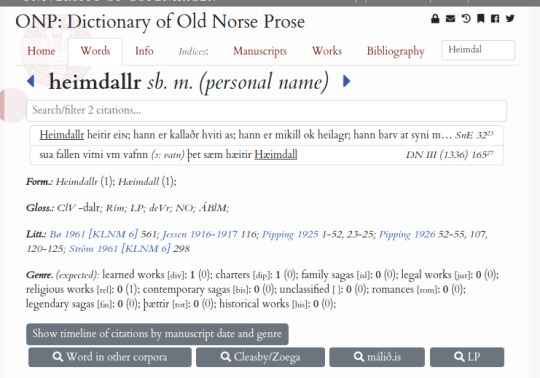
If you click on the first entry it brings you here and shows you a whole bunch of stuff, but you need to know what you're looking at. If you can read Old Norse you can get the context from reading the actual text it appears in, but if you don't now you know you can find it in Snorri's Edda (which you knew already anyway, but if it had thrown some saga you didn't know existed at you, now you'd know to look for that too).
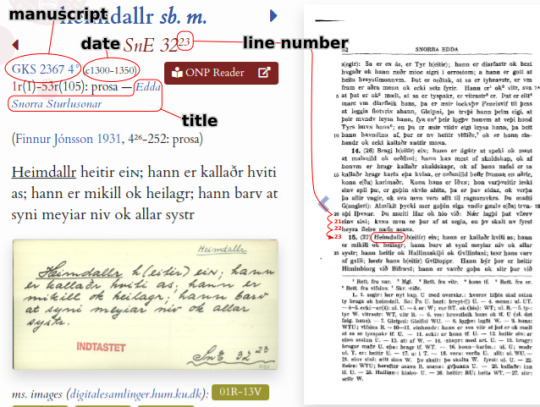
This is the site I work with the most. When someone asks me something like "what exactly does vitki mean?" I go here first, because it isn't just a definition, it's actually the complete usage of the word in its context. Yeah, it's not great for the present task, but if you do know what it's good at (common nouns, verbs, etc in prose works) it's a very powerful tool.
We'll come back to something to get prose texts at the end but for now let's focus on poetry. Until the new electronic Lexicon Poeticum is complete, we still have the old version. It can be found at http://www.septentrionalia.net/etexts/ and either downloaded or you can use the web interface at http://www.septentrionalia.net/lex/index.php?book=e&page=-15&ext=png.
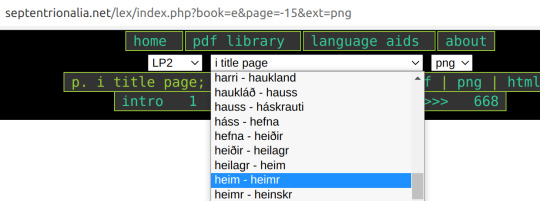
Then we find:
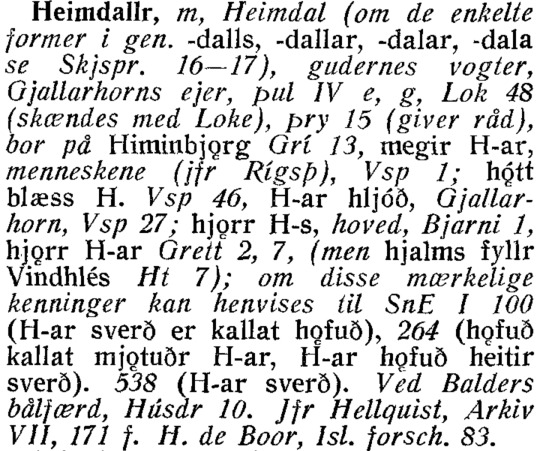
It's just a big PNG, not machine-readable at all, and barely human-readable. What little commentary there is here is in Danish. I'll break it down for you.
Heimdallr, m, Heimdall (about the individual forms in the genitive. -dalls, -dallar, -dalar, -dala see Det norsk-isl skjaldesprog 16-17), watchman of the gods, owner of Gjallarhorn.
It then goes on to list the poems where Heimdallr appears, sometimes with a little note to hint at the context. You're gonna need these pages in the front of the book to figure out what the abbreviations (forkortelser) mean:
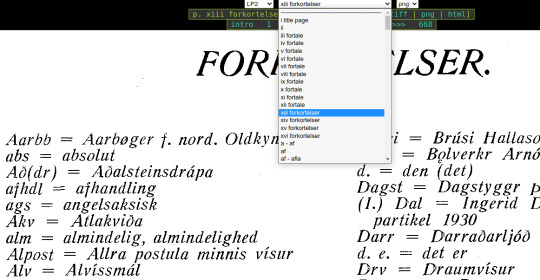
Þulur IV
Lokasenna 48 (note: Heimdallr speaks in 47, but the word "Heimdallr" doesn't appear until Loki talks back, so 48 is listed)
Þrymskviða 15
Grímnismál 13
Vǫluspá 1
Vǫluspá 46
Vǫluspá 27 (not sure why it's listed out of order)
Bjarni ...ason (his patronymic is not known) 1
Grettir Ásmundarson 2:7
Háttatal 7 (this one uses the name Vind(h)lér, not sure why Finnur didn't put it separately)
Húsdrápa 10
A couple notes here. The dictionary was put together by Finnur Jónsson, who also did a big edition of skaldic poetry, the Skjaldedigtning, and these references are made using the same classification system he used for that. The one says "Grett 2, 7" means the poem is by Grettir Ásmundarson, and is the seventh verse of the second grouping of verses in Skjaldedigtning. The same site that hosts the Lexicon Poeticum has scans of that. But if you're looking for an English translation of that poem, you won't find it there, and you'll have to find another way to track it down. That brings us to our next resource.
LexiconPoeticum.org is still in progress but will eventually replace the old paper Lexicon that I just walked you through. The reason it's taking so long is that they're doing some pretty incredible in-depth analysis of every word, every kenning, lots of other little details, not to mention huge amounts of commentary and explanation. You can use it already, you just can't trust that it's going to show you everything, and it does reserve some functionality for people who are actually part of the project. If you search "Heimdallr" it'll give you three of the results that Finnur listed, Húsdrápa, Bjarni someonesson, and the nafnaþulur (2) (lists of names; there's two for gods so naturally Heimdallr is in them).
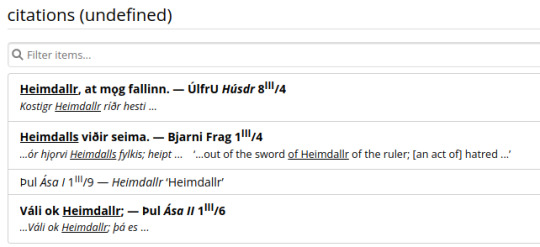
Those link to the sister site, the Skaldic Poetry Project, the other interface for basically the same project. But we're still missing stuff. Vǫluspá, Grímnismál, Þrymskviða, and Lokasenna you should all be able to handle on your own, and they're not skaldic poetry anyway, so the site isn't going to help you with that. Háttatal, if you didn't know, is part of Snorri's Edda (the Prose Edda) so you should be good on that too, or if not go find it at http://vsnrweb-publications.org.uk/
55 notes
·
View notes
Text
and Another thing
re/ the ergi discussion re/ drengr etc—
I feel like what’s really missed here when talking about cultural norms at that time is the true contrast between níðr and either of those two other things. It was always better to be drengr than ergi, but both was better than níðr. You can’t talk about these things in a vacuum. There was more to society than whether you were drengr or ergi—there just was.
For example, yes, drengr wasn't restricted to men; it was more of the cultural sense of what was expected of most people, and for certain, people of power and/or means. Drengr is bravery of the self. Just as honor to community didn't mean martyrdom, this courage didn't mean toxic pride nor vicious cruelty. It was self-control. It is, in essence, boundary work: consistently being able to stand up for yourself and your actions, to be appropriately assertive in your responses, and show fair play.
Ergi had those passive connotations I spoke about in my previous post, which included observational skills, often the ones that led to a variety of magic (although you’ll notice the berserker-úlfhéðnar-skipta hǫmum type magic wasn’t considered ergi and I’m sure you don’t need to be led to why). This “hesitation” was "cowardly,” and being on the receiving end of information was less valued that the one powering the information. This is why ergi comes into play as likening men to women, both from a social construct setting as well as, later, sexual slang (bottoming for men—mind you, topping wasn’t ergi—and horniness for women, how weird they want it like a man does).
Just as men could be ergi for practicing magic (even Óðinn was called ergi!), and women could be ergi, women could also be drengr. (Shieldmaidens, anyone?) These “gendered” concepts were based in expectations but were not exclusive to gender. I think maybe that’s why they went with coward in AC:Valhalla: to emphasize the cultural component over the slang. However! Let’s get back to níðr! It was no joke. To have the status of níðr was to be deemed shameful; a villain, avoided, reviled, and untrustworthy—a níðingr.
Typical causes for such disgrace included: desertion; treachery; shameful acts (such as killing kinsmen or defenseless people); breaking one's oath. When a man betrayed the trust of another man, that man would become known as a níðingr. This person wasn’t a coward: he was a problem. You couldn’t count on him to contribute to society. You couldn’t rely on him as a friend or a neighbor, or a brother-in-arms. He was unpredictable, untrustworthy—useless.
Okay, cool? Cool. Let’s get back to drengr/ergi. Not useless.
Sometimes, if someone had it out for you, ergi could land you as níðr if you failed to defend yourself (failing to defend yourself when insulted? not a good look). Ergi ≠ níðr; it wasn’t a perfect circle venn diagram, you could be ergi without being níðr. Drengr was a state of existing, a way of being and moving through the world, a default setting, even, if you well. People didn’t call people drengskapr regularly; this was what was expected of you. To be called drengskapr outright meant you did something really noteworthy. So, what else was involved in being “manly,” if that’s how we’re going to code drengr?
Being a good fucking person.
No really. It wasn’t just Hi here’s my dick, fuck you, eat my sword—drengr (as aforementioned) was about being composed of the self and an asset to community. Keeping friðr, for example—maintaining social contracts and bonds in a peaceful way, agreement not to cause physical harm to each other. There’s luck, honor, reputation, hospitality—all key components of functioning in this society. You didn’t know when you were going to be the one that needed help, so you helped where you could. Being a good viking was about interdependence—not about toxicity.
(*At least as much as I’ve learned in all of my research.)
14 notes
·
View notes
Note
@gallifreyianrosearkytiorsusan (Love how G-man recognizes Earthis an old name for Terra right off the bat! Also poor Sgt. Haraldr)
"Chaplain Petras congratulated him on neat loss of the Primaris Astartes under his comand, Lord Guilliman, sir," Tryggvi bit out, before he could think trying and failing to control his growl with the rage bubbling up in him. "Bastard all but stated outright that he believed loseing the fleet to the Warp had been a purposefull ploy to kill off the Primaris Astartes."
The Primaris scout caught the scent of Kara's suden fright at the same time Hamundr kicked him in the ankle. Carefully he gentled his voice and knelt by her chair. "Friðr, lítill móðir. Peace, little mother. You are safe. I did not mean to frighten you. Commander Sicarious' injuries come from remedying a grave injustice to my brethren."
Kara drew in a steadying breath as Sargent Hrodr began talking very quickly to Lord Guilliman. "Well I hope he kicked the other guy's ass to hell and back, then," she stated firmly. "Though, if Cato won and he looks that bad, how bad off is the other guy?"
Alow me to present how The Astarts under Captain Ash'val learn Cato isn't a Primaris killer:
One very harried and much in the need of a vacation Primarch finds himself in the woods. Step one find running water and go down hill to find civilization. Or he could folow the smell of baking bread. That's very promising. He sees a woman in a primative kitchen working on a less primative dataslate so he asks where he is,
Rose is baking bread in the outdoor oven. Gradeing spring semister final papers on her laptop while she hurries up and waits. Oh the dog is barking there's a very important Ultramarine. Definitely wished she'd goten someone to start teaching her Gothic sooner
The woman has just enough Gothic to convey going to call a translator and offer him hospitality. Some beverage sweet tannic and slightly mentholated from a large spigoted canister in Astartes sized cup. Very curious. The dog, a canine of noble and ancient lines is sideling while still seated over with the clear intent on making friends.
Rose can't reach Cato so tries Hrodr on speaker phone instead. "My bonded isn't answering-" and is cut off by an enthusiastic Space Wolf.
"Your bonded, how does the little mother to be put it? He beat the taste out of the mouth of Black Templar Chaplin Petras in single combat. While the Chaplin was in full armor! Sadly his vox did not survive. We shall sing of his victory and feast it. Once we get back from taking him to the Apothecary anyways. You should start comp-" Hrodr himself is cut off by none other than the man himself.
"Serves the bastard right for congraulating me for losing Astartes to the warp! How dare he imply that the Duke of Talassar would betray my comand! And so help me Wolf if you start singing i'll beat you and your double image to Mars and back!" Cato is being very Cato.
"Put the Head of my Viccatrix Guard on the vox. Now." Rose doesn't need to understand all the words to pass over the phone to the imperiously held out hand.
Cato thinks he may have been hit in the head even harder than he initially thought.
Yes! I love this.
Cato has time sit down again. Oh holy God Emperor.
"Lord Father?" Cato crooks out as he snaps to attention at the sound of a very important person. "How may I assist you, sir?"
The Space Wolves look like they are punch drunk and suddenly very intensely listening in- while also sending messages that A Primarch has landed on Ancient Terra.
347 notes
·
View notes
Text
Gamalt ríki faðmar þá grænu ok svǫrtu hringi lífs ok aldrslita
Gamalt ríki faðmar þá grænu ok svortu bringi lífs ok aldrslita, þá er sér engan endi eiga. Skógar eru þeir kallaðir, en grænir hreifa kvistir á því steinda ljóni þeir virðask mér. Ek ráfa gegnum dokkvan himin ok uppljó- maða Leifins grundar mána viði, umkringdr dansandi Álfum. Hvar er sá friðr er Viðris van- da veðrstafir fundu eitt sinn í þessum lífssolum sem sér engan endi eiga? Úr fjarska vígleipr Surts brennir sjóvoll við svorð. Guðbrandsdalr er sá kallaðr ok Yggs ærir hljóta að hafa flúið frá Hliðskjálfa sínu er ek nálgaðisk þann stað sem brátt skal aldrei verða aptr. Brá merki mín nam sjá fylkingu Hvíta Krists, án tolu, leika hormungar song hinna syngjandi randar mána millum toptar nokkva, helgt Heimdallarvtan ok vápns viða. Á hvítum sandi, útskorið líknes- ki Belja dólgs er brennt ok beljandi glæðurnar fylla himininn af heift. Þegar trjágoðið hrynr fram á jorðina sem flaut í oddlá loganda, margir váru skornir hálsaar ungra sem aldna ok hofuð þeirra klofin endrkasta élkers botnum Ymis á ný. Í miðju þess alls ek sé hinn umsnúna hersi veita sína ræðu hatrsfulla yfir þrælalýð.
Dag reis sinn með sigri snjallastr faðir allra
sonr huggaði seggi sólar hauðrs - af dauða. Áðr batt flærðar fróðan fjanda heilagr andi fast ok fyrða leysti fremðarstyrkr ór myrkrum.
(Anonymous Poems, Leiðarvísan 31)
Ótraulla má ollu aldýrr faðir stýra; sterkr es engr, svát orki aptrat dróttins krapti. Gramr skóp hauðr ok himma hreggranns sem kyn seggja; einns salkonungr solar snjallr hjalpari allra.
(Anonymous Poems, Leiðarvísan 29)
Sem straumar af heiðnum vápna læk hefja flæði sitt í árnar, ek ráfa á ný inn í þann sárgagls hirðimeið sem forðum. Hvar eru þeir staðir er ek eitt sinn heima kallaði? Er þat nú sú stund sem mistilteinn hæfir hinn gofga hugstrandar hall Baldrs ok drífir þessa alda heima til Rag- naraka? Eru þetta ljósskipti goða varnenda? Er þetta stund sú er jarðar hrísla skal bresta ok brenna bitrlega niðr í svorð? Allar blóðeisur ok bendagar Krists ok ásmeginna aldinna virðask nú há einvígi sem spýjandi fleina flóð vellr úr undirforlum tungum Loka.
English: A Kingom Of Old
A kingdom of old embraces neveren- ding green and black circles of life and death. Woods they are called, but green hands on this lion of stone they are to me. I wander through dark skies and alighted trees surroun- ded by dancing Álvar. Where is the peace that men found once in these endless halls of life? From afar, swords of Surtr set horizons afla- me. Guðbrandsdalr it is called, and gods must have fled from their thrones when I approach a place that soon shall never be again. My eyes see countless soldiers of the White Christ play a dreadful song of singing swords in between houses, divine Heimdallarvtan and trees. On white sand, a carved statue of Þórr is set afla- me and screaming embers fill the sky with rage. When the wooden god hits the blood-soaked ground of flames, many young and old thro- ats are cut and open heads mirror the worlds of Ymir again. In the middle, I see converted hersir delivering hateful speaches towards an enslaved flock.
The most valiant father of all rose from death with victory on his day; the son of the land of the sun comforted men. Previously the ho- nour-strong Holy Spirit bound fast the deceit-le- arned fiend and released men from darkness.
The altogether precious father is able to govern everything indefatigably; no one is so strong that he is able to impede the Lord's power. The king of the storm-house made land and heavens as well as the race of men; the excellent king of the hall of the sun is alone the helper of all.
(Anonymous Poems, Leiðarvísan 29)
As streams of heathen blood start to flow into rivers, I began to wander again into the woods. Where are the places that I once called home? Is this now the time that mistilteinn hits the gra- ceful heart of Baldr and drives these worlds into Ragnarok? Is this the twilight of the gods? Is this the time Yggdrasil shudders and bitterly burns to the ground? All knives and swords of Christ and gods of old seem to duel now that sputtering blood boils out of the plunging tongues of Loki.
#Árstíðir lífsins#Arstidir Lifsins#International#Iceland#Germany#Pagan Black Metal#Black Metal#Bandcamp
0 notes
